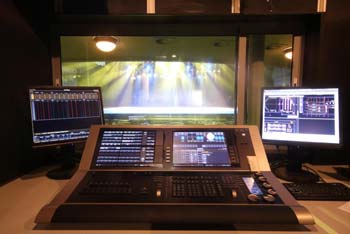Few theatres around the world have such a long, rich and tumultuous history as the State Theatre of Nations in Moscow, Russia. It stands as a testament to the importance of the arts, having survived many challenges. A recent large-scale renovation means the theatre's tough times are a thing of the past, and an equipment upgrade - including a new lighting system starring an ETC Eos lighting control desk and Source Four luminaires - prepares the Theatre of Nations for a promising future.

In 2007, Russia began a campaign to modernize its theatres. The Ministry of Culture awarded the Theatre of Nations a grant to refurbish its Russian Revivalist building. The four year renovation project expanded the building by over 3,900sq.m, with new rehearsal spaces, offices, a restaurant and a blackbox theatre.
Included in the grant was €11m to upgrade the technical equipment, from stage mechanics to sound and lighting systems. For the lighting, ETC dealer Doka Center was tasked with creating a user friendly system, because the Theatre of Nations is lit by touring designers from all over the world who have experience on different equipment run in dozens of languages.
"The Theatre of Nations has a unique style," says Aleksandr Kelganov, who worked on the lighting installation. "It's a universal stage ready for any musical or theatrical group to perform any repertoire without a problem. Therefore, the theatre's lighting system was designed to carry out a diverse range of tasks."
Doka put an ETC Eos control desk at the helm of the system to seamlessly control the lighting, including hundreds of ETC Source Four luminaires with field angles ranging from 10° to 90°. Eos's intuitive design makes it an easy tool for any designer, and its broad functionality covers any production with ease.
Another challenge in creating the lighting system was the adaptability of the main hall's performance space. The hall previously had 1,000 seats, but following the renovation the seat count was reduced to a more intimate 570. Balcony seats were removed to make way for technical equipment like followspots and other lighting fixtures, and none of the house seating is permanent.
The orchestra pit and part of the house floor can elevate to become level with the stage, extending the acting space, and automated hoists can raise and lower different parts of the stage for various arrangements. The hall also has the capability of flipping 180°, turning the house into the performance space and the stage into audience seating.
To keep up with the constantly changing layout, the lighting staff uses ETC's iRFR application with its Eos system. The app turns mobile devices into radio focus remotes, allowing operators to run the lights from the control room, backstage, sitting in the house or anywhere else in the venue. "I really like and enjoy using the remote control system for the iPad," says lighting designer Alexander Sivaev. "From a production standpoint, it really helps organise the on stage chaos which comes with such big, complex productions."
The first show to use Eos was the televised grand reopening concert back in September, a production which covered every genre the Theatre of Nations represents - chamber music, dance, dramatic theatre, children's music, poetry readings and more - and featured pre-recorded well-wishes from international stars, including Helen Mirren, John Malkovich and Robert Wilson. Sivaev says, "The system worked great, without a single hiccup. I'm incredibly satisfied with the Eos system."
Since the grand reopening, the Eos and Source Fours have been used on dozens of shows, including Circo Ambulante, Caligula, Miss Julie, Shosha, and a touring production of Sanya, Vanya, Rimas put on by the Minusinsk Drama Theater from the Krasnoyarsk region of Russia.



